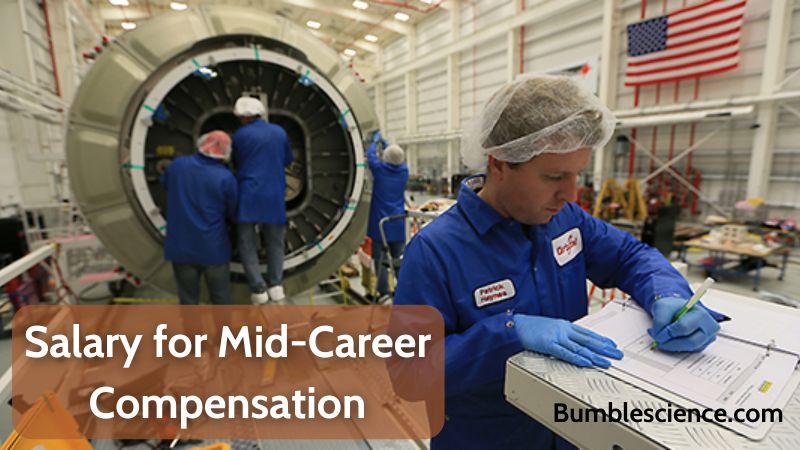In the realm of aerospace engineering, few organizations carry as much weight and prestige as NASA. The National Aeronautics and Space Administration stands as a beacon of scientific and technological advancement, pushing the boundaries of human understanding and exploration beyond Earth’s confines. Within the vast expanse of NASA’s endeavors, aerospace engineers play a pivotal role, shaping the future of space exploration and aeronautical innovation. Central to understanding the allure of a career with NASA is delving into the intricacies of compensation, particularly the NASA aerospace engineer salary. Let’s discover it with Bumblescience in the following.
NASA Aerospace Engineer Salary: Entry-Level Compensation
Astronomical aspirations are often met with commensurate compensation, and the realm of NASA engineering is no exception. The salary structure for NASA aerospace engineers reflects the organization’s commitment to attracting top-tier talent and fostering an environment conducive to groundbreaking discoveries. At the heart of this structure lies a range of factors influencing remuneration, from experience and education to geographic location and specialized skills.
For aspiring aerospace engineers eyeing a career trajectory at NASA, understanding the financial landscape is paramount. Entry-level positions within NASA typically command salaries ranging from around $69,000 to $90,000 annually for aerospace engineers fresh out of university. These positions serve as the launching pad for budding engineers, providing invaluable hands-on experience and exposure to the cutting-edge technologies driving NASA’s missions forward.
Mid-Career Compensation
As aerospace engineers progress in their careers and accrue experience, their earning potential within NASA grows exponentially. Mid-career aerospace engineers at NASA can expect to earn salaries ranging from $90,000 to $120,000 per year, reflecting the increased responsibilities and expertise they bring to the table. With each milestone achieved and project conquered, aerospace engineers ascend the ranks, accompanied by corresponding increases in compensation.
Beyond Monetary Considerations
However, the allure of a NASA aerospace engineer salary extends beyond mere monetary considerations. It encompasses the intangible rewards of contributing to humanity’s collective quest for knowledge and exploration. Engineers at NASA find themselves at the forefront of scientific discovery, working on projects that push the boundaries of what is technologically feasible. Whether it’s designing spacecraft for interplanetary missions or developing innovative propulsion systems, every endeavor undertaken by NASA engineers is imbued with a sense of purpose and significance.
Moreover, the collaborative environment fostered within NASA’s ranks adds another layer of richness to the compensation package. Working alongside some of the brightest minds in the aerospace industry, engineers at NASA benefit from unparalleled opportunities for professional growth and development. The exchange of ideas and expertise that permeates NASA’s culture serves as a catalyst for innovation, propelling engineers to new heights of achievement.
Supplementary Benefits and Incentives
In addition to base salaries, NASA aerospace engineers may also be eligible for a range of supplementary benefits and incentives. These may include performance bonuses, retirement plans, health insurance coverage, and access to specialized training programs. Such perks further enhance the overall compensation package, reinforcing NASA’s commitment to supporting its workforce and fostering a thriving community of engineers.
Geographic Considerations
Geographic location also plays a significant role in determining the salary of a NASA aerospace engineer. Engineers stationed at NASA’s headquarters in Washington, D.C., or at its various research centers across the United States may experience variations in cost of living and corresponding adjustments in salary. For instance, engineers working at NASA’s Johnson Space Center in Houston, Texas, may enjoy lower living expenses compared to their counterparts in Silicon Valley, California, leading to potential differences in compensation.
Specialized Roles and Expertise
Furthermore, the specialized nature of certain aerospace engineering roles within NASA can command higher salaries. Engineers with expertise in areas such as propulsion systems, spacecraft design, or robotics may find themselves in high demand within the organization, warranting premium compensation packages. These specialists bring a unique set of skills and insights to the table, driving innovation and pushing the boundaries of what is achievable in space exploration.
Opportunities for Advancement
As aerospace engineers ascend the ranks within NASA, opportunities for advancement and increased compensation abound. Senior-level engineers and those in leadership positions within the organization can command salaries upwards of $160,000 per year or more, reflecting their wealth of experience, expertise, and contributions to NASA’s mission success. These seasoned professionals serve as mentors and role models within the organization, guiding the next generation of engineers toward ever-greater accomplishments.
Conclusion
In conclusion, the NASA aerospace engineer salary is a reflection of the organization’s commitment to fostering innovation, exploration, and scientific discovery. From entry-level positions to senior leadership roles, aerospace engineers at NASA are rewarded not only with competitive compensation but also with the satisfaction of contributing to humanity’s quest for knowledge and understanding of the cosmos. Aspiring engineers drawn to the allure of space exploration would do well to consider the myriad opportunities awaiting them within the ranks of NASA, where the sky is not the limit, but merely the beginning of an extraordinary journey.


